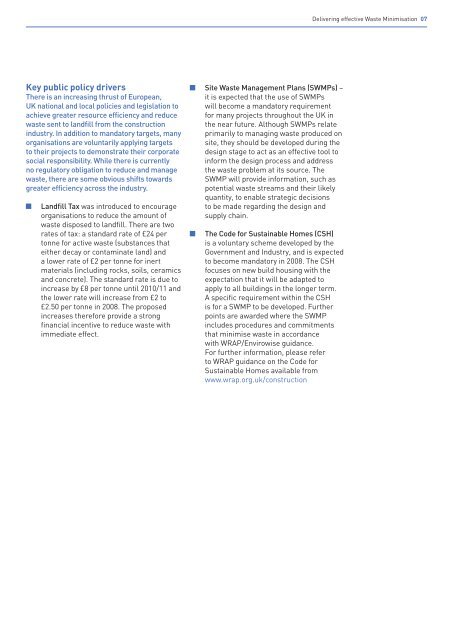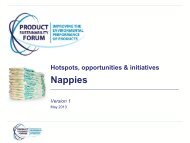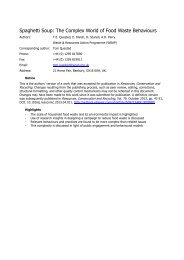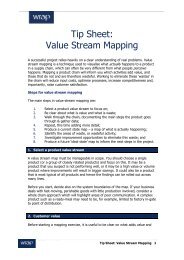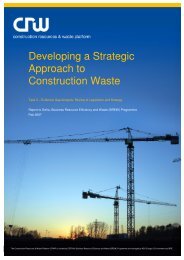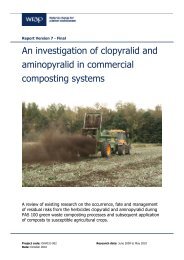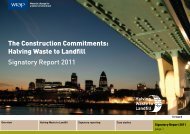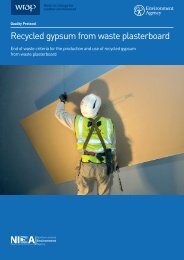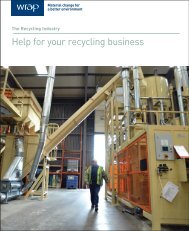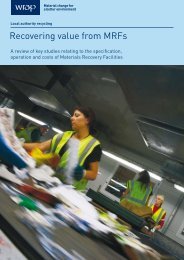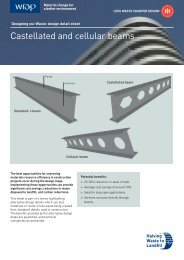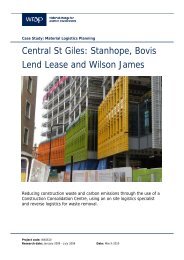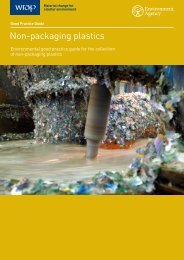Delivering effective Waste Minimisation - Wrap
Delivering effective Waste Minimisation - Wrap
Delivering effective Waste Minimisation - Wrap
You also want an ePaper? Increase the reach of your titles
YUMPU automatically turns print PDFs into web optimized ePapers that Google loves.
<strong>Delivering</strong> <strong>effective</strong> <strong>Waste</strong> <strong>Minimisation</strong> 07<br />
Key public policy drivers<br />
There is an increasing thrust of European,<br />
UK national and local policies and legislation to<br />
achieve greater resource efficiency and reduce<br />
waste sent to landfill from the construction<br />
industry. In addition to mandatory targets, many<br />
organisations are voluntarily applying targets<br />
to their projects to demonstrate their corporate<br />
social responsibility. While there is currently<br />
no regulatory obligation to reduce and manage<br />
waste, there are some obvious shifts towards<br />
greater efficiency across the industry.<br />
Landfill Tax was introduced to encourage<br />
organisations to reduce the amount of<br />
waste disposed to landfill. There are two<br />
rates of tax: a standard rate of £24 per<br />
tonne for active waste (substances that<br />
either decay or contaminate land) and<br />
a lower rate of £2 per tonne for inert<br />
materials (including rocks, soils, ceramics<br />
and concrete). The standard rate is due to<br />
increase by £8 per tonne until 2010/11 and<br />
the lower rate will increase from £2 to<br />
£2.50 per tonne in 2008. The proposed<br />
increases therefore provide a strong<br />
financial incentive to reduce waste with<br />
immediate effect.<br />
Site <strong>Waste</strong> Management Plans (SWMPs) –<br />
it is expected that the use of SWMPs<br />
will become a mandatory requirement<br />
for many projects throughout the UK in<br />
the near future. Although SWMPs relate<br />
primarily to managing waste produced on<br />
site, they should be developed during the<br />
design stage to act as an <strong>effective</strong> tool to<br />
inform the design process and address<br />
the waste problem at its source. The<br />
SWMP will provide information, such as<br />
potential waste streams and their likely<br />
quantity, to enable strategic decisions<br />
to be made regarding the design and<br />
supply chain.<br />
The Code for Sustainable Homes (CSH)<br />
is a voluntary scheme developed by the<br />
Government and Industry, and is expected<br />
to become mandatory in 2008. The CSH<br />
focuses on new build housing with the<br />
expectation that it will be adapted to<br />
apply to all buildings in the longer term.<br />
A specific requirement within the CSH<br />
is for a SWMP to be developed. Further<br />
points are awarded where the SWMP<br />
includes procedures and commitments<br />
that minimise waste in accordance<br />
with WRAP/Envirowise guidance.<br />
For further information, please refer<br />
to WRAP guidance on the Code for<br />
Sustainable Homes available from<br />
www.wrap.org.uk/construction


